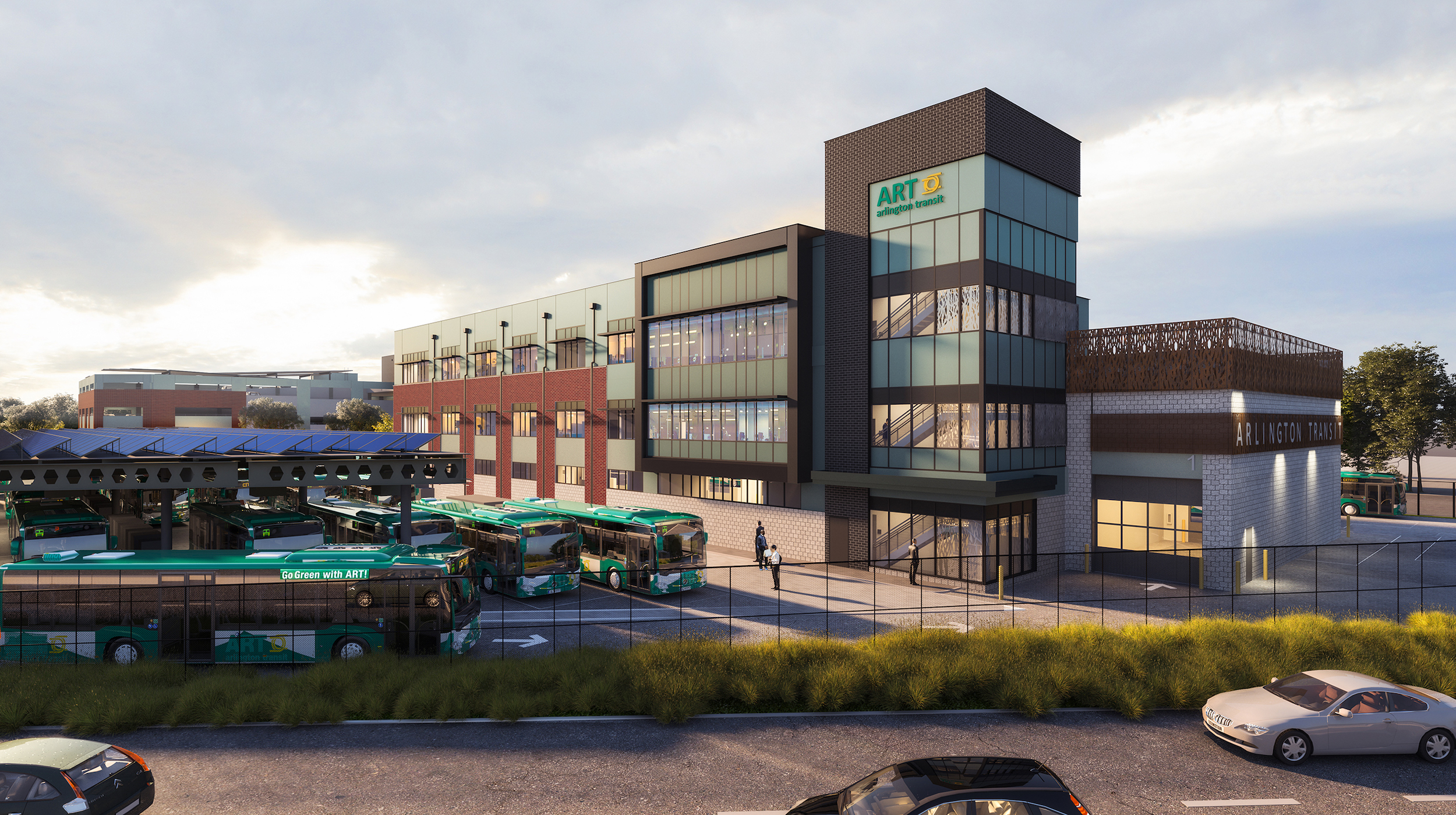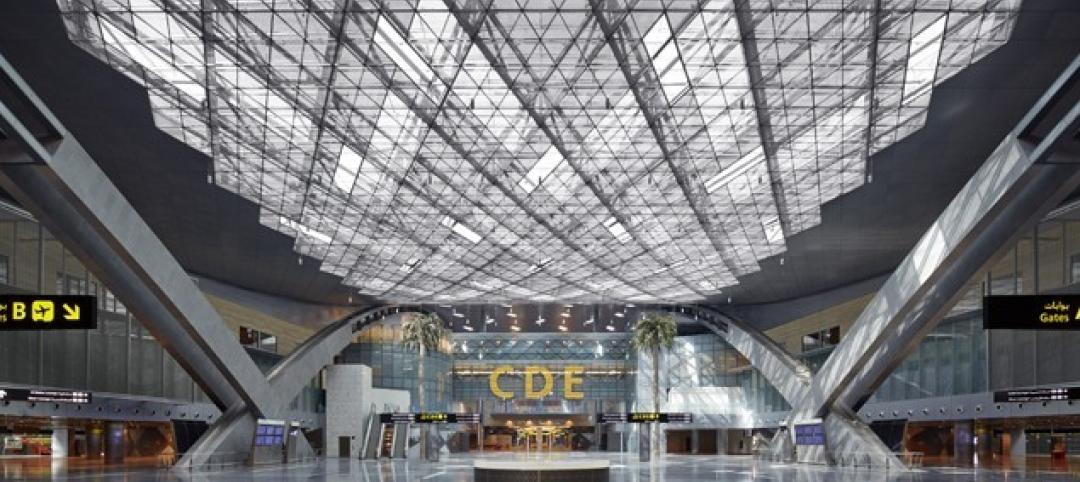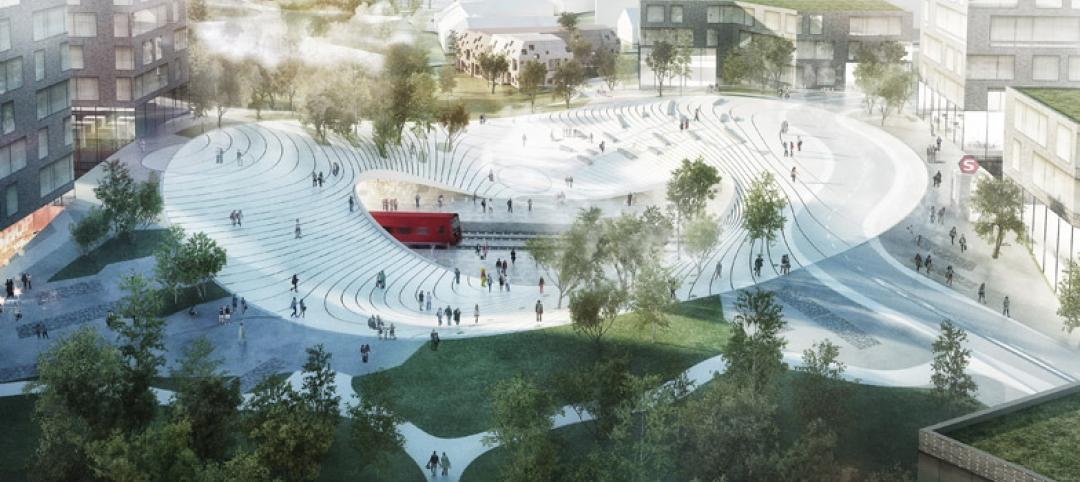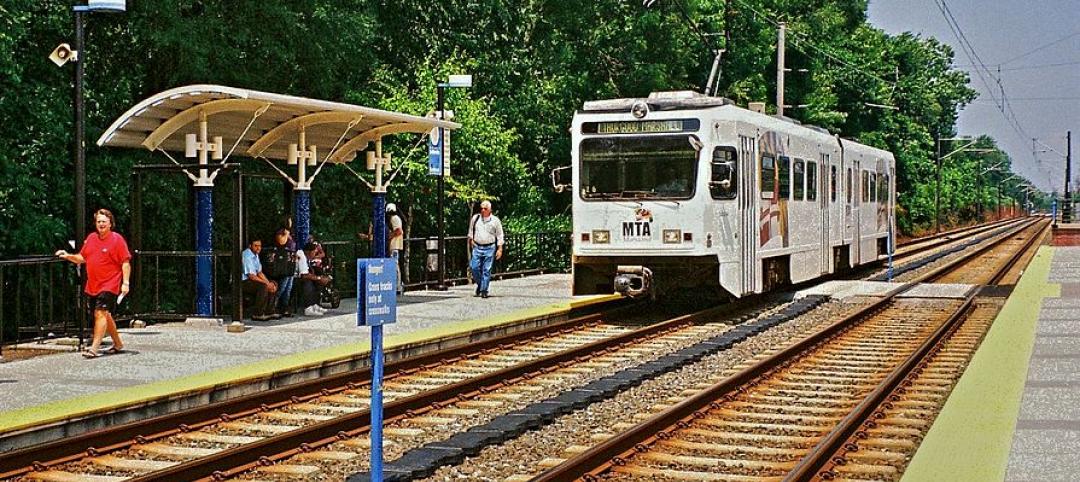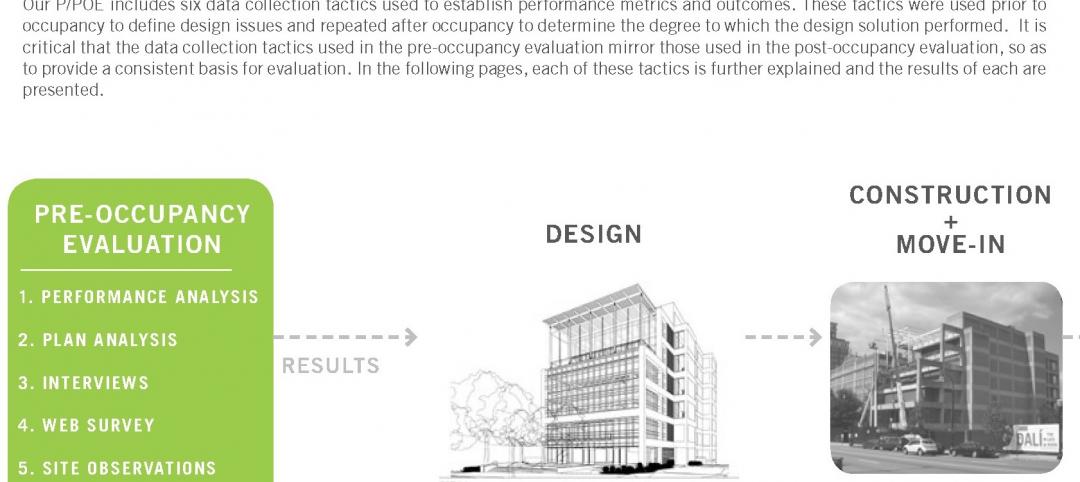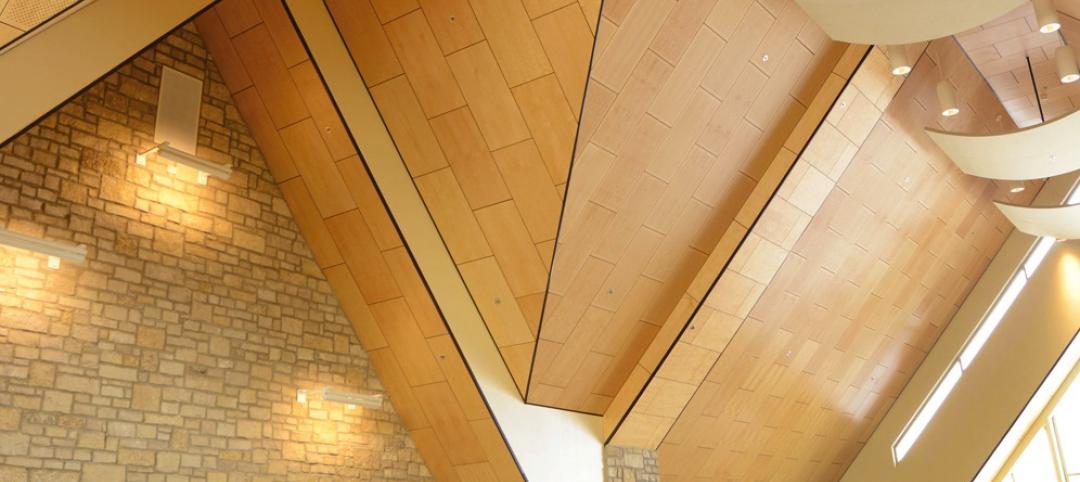Arlington (Va.) Transit’s new operations and maintenance facility will support a transition of their current bus fleet to Zero Emissions Buses (ZEBs). The facility will reflect a modern industrial design with operational layouts to embrace a functional aesthetic. Intuitive entry points and wayfinding will include biophilic accents. Large high-performance facades are designed with materials selected for longevity, resilience, and durability.
The first level will include seven repair bays and one chassis wash bay, workshops, supervisor offices, and parts storage rooms. The second level will include an administration suite, conference and training rooms, locker and break rooms, and additional parts storage. The third floor will serve operations and administration.
Operations and dispatch will overlook the bus yard, including bus operator support areas for an operator’s day room, locker and break rooms, and an exterior rooftop patio with vegetative roof. Other features include training rooms, conference rooms, an exercise room, and wellness and quiet rooms.
The project adapts three parcels of land, separated by a private access road and a regional storm water channel, for two new facilities. The two new structures—a three-story, 45,433-sf operations and maintenance facility and a four-tier, 65,096-sf parking structure—will be positioned within the reprogrammed site to support transit operations and provide a highly aesthetic piece of civic architecture for the county and surrounding area, according to a news release from Stantec.
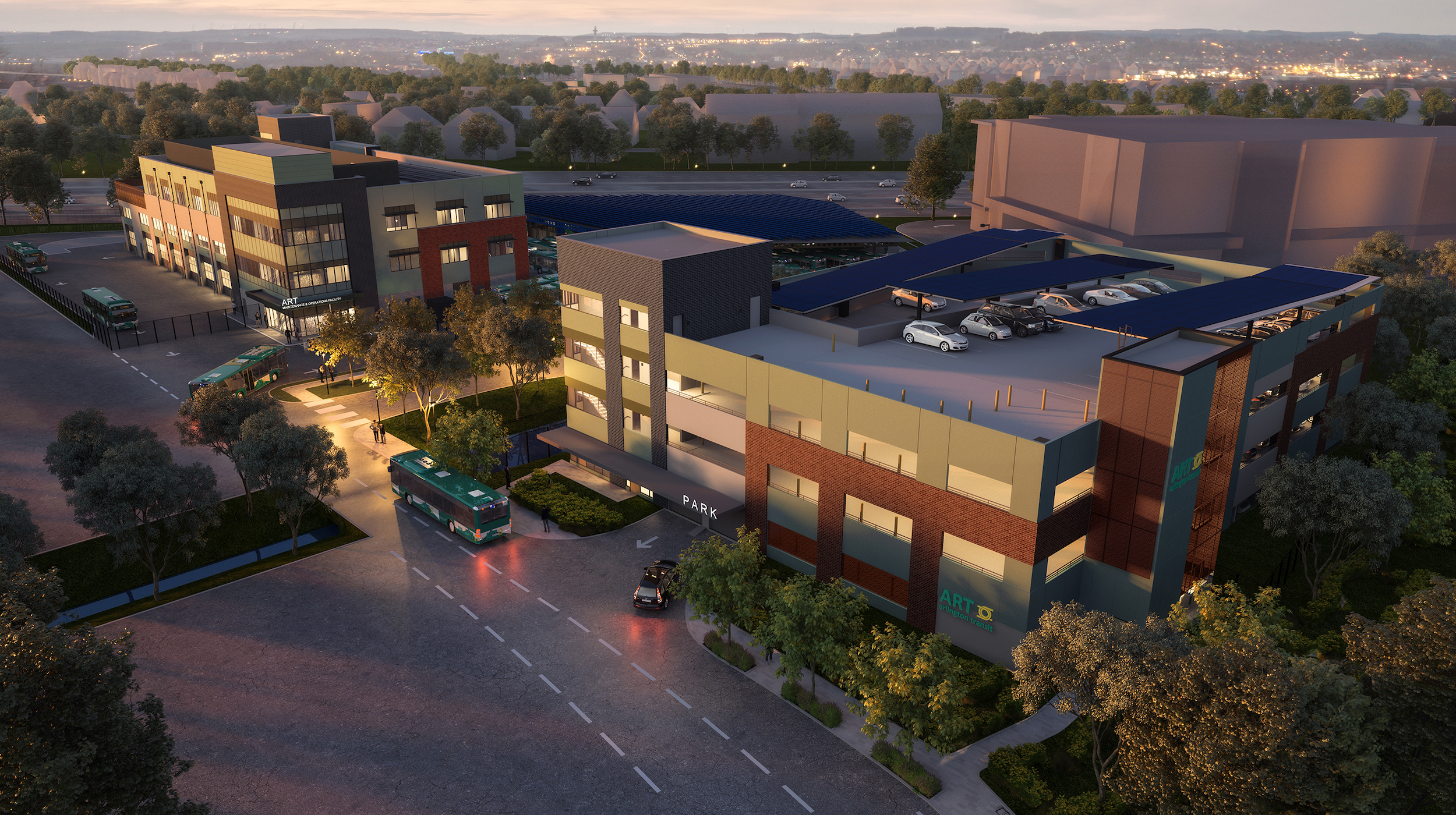
To address long-term stormwater issues and more efficient operations, site improvements include demolition of the existing buildings, channel redesign and restoration, site stormwater management, road crossing improvements, and surface parking for buses.
To support the ZEB charging infrastructure, Stantec is providing power modeling to determine the charging requirements for the fleet, and help to inform ART of any modifications, limitations, or opportunities within their service routes. Stantec will estimate the energy requirement at the vehicle level and the power capacity at the transit facility to identify the required utility upgrades and equipment, along with a long-term plan for incremental growth that aligns with anticipated vehicle replacement and upgrades.
On the building team:
Owner: Arlington County
Design architect: Stantec
Architect of record: Stantec
MEP engineer: GPI
Structural engineer: Ehlert Bryan
General contractor/construction manager: Turner Construction
Related Stories
| Dec 28, 2014
The future of airport terminal design: destination status, five-star amenities, stress-free travel
Taking a cue from the hospitality industry, airport executives are seeking to make their facilities feel more like destinations, writes HOK's Richard Gammon.
| Nov 18, 2014
New tool helps developers, contractors identify geographic risk for construction
The new interactive tool from Aon Risk Solutions provides real-time updates pertaining to the risk climate of municipalities across the U.S.
| Oct 16, 2014
Henning Larsen Architects to design train station for planned Danish town
Danish firm Henning Larsen Architects won Frederikssung municipality’s architecture competition for a regional train station in the planned city of Vinge—Denmark’s largest urban development.
| Oct 16, 2014
Perkins+Will white paper examines alternatives to flame retardant building materials
The white paper includes a list of 193 flame retardants, including 29 discovered in building and household products, 50 found in the indoor environment, and 33 in human blood, milk, and tissues.
| Oct 15, 2014
Harvard launches ‘design-centric’ center for green buildings and cities
The impetus behind Harvard's Center for Green Buildings and Cities is what the design school’s dean, Mohsen Mostafavi, describes as a “rapidly urbanizing global economy,” in which cities are building new structures “on a massive scale.”
| Oct 12, 2014
AIA 2030 commitment: Five years on, are we any closer to net-zero?
This year marks the fifth anniversary of the American Institute of Architects’ effort to have architecture firms voluntarily pledge net-zero energy design for all their buildings by 2030.
| Oct 3, 2014
New survey tracks Americans’ attitudes towards transit use
A record 10.7 billion rides were taken on public transit in the United States last year. And a national survey of Americans finds that the speed, reliability, and cost, more than any other factors, determine people’s willingness and frequency of use.
| Sep 24, 2014
Architecture billings see continued strength, led by institutional sector
On the heels of recording its strongest pace of growth since 2007, there continues to be an increasing level of demand for design services signaled in the latest Architecture Billings Index.
| Sep 22, 2014
4 keys to effective post-occupancy evaluations
Perkins+Will's Janice Barnes covers the four steps that designers should take to create POEs that provide design direction and measure design effectiveness.
| Sep 22, 2014
Sound selections: 12 great choices for ceilings and acoustical walls
From metal mesh panels to concealed-suspension ceilings, here's our roundup of the latest acoustical ceiling and wall products.


